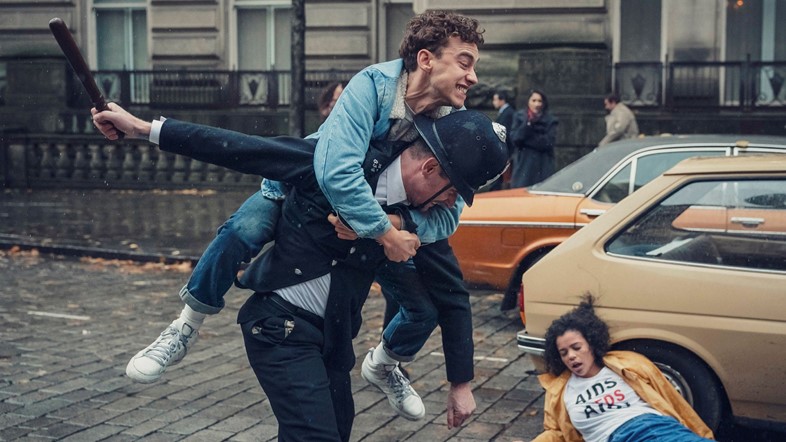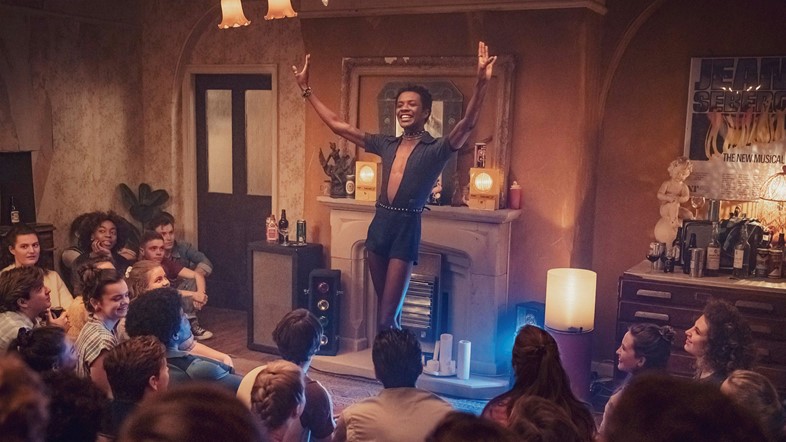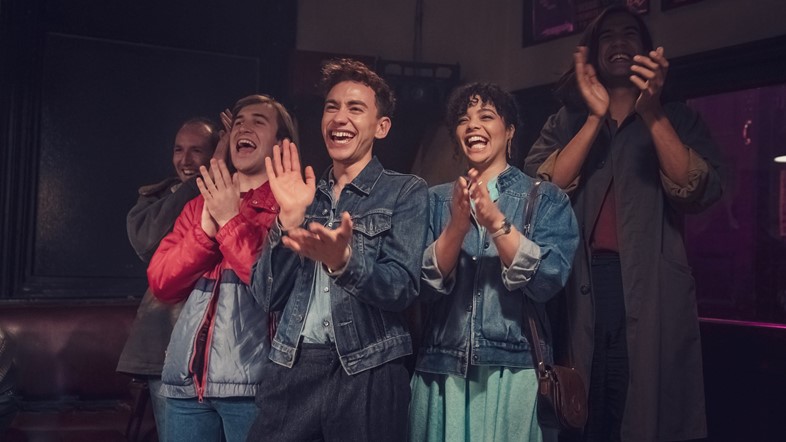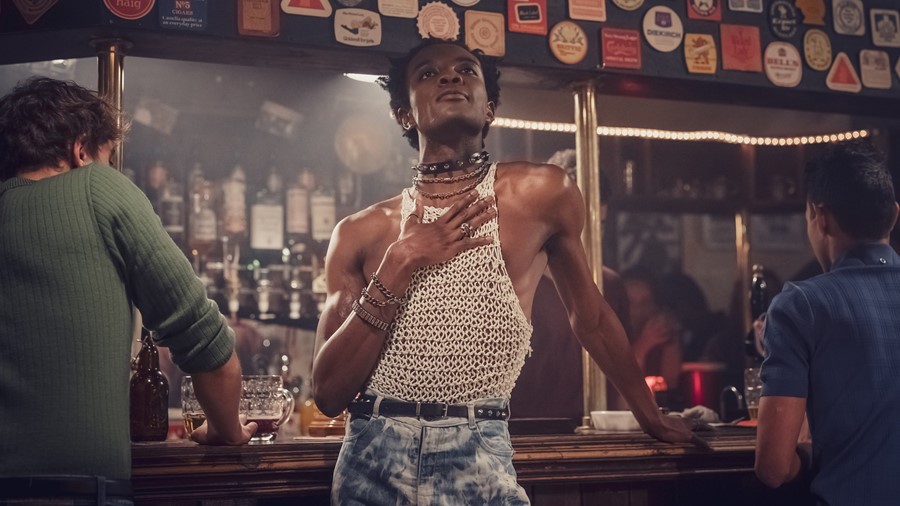Russell T Davies sits down with Nick Levine to discuss his new series rooted in the 80s Aids crisis, LGBTQ representation on screen and straight actors playing gay characters
When it comes to putting queer characters on screen, Russell T Davies is a genuine pioneer. Since he created the groundbreaking gay drama Queer as Folk in 1999, the Swansea-born writer has consistently elevated LGBTQ representation in mainstream TV. During his five-year tenure as Doctor Who showrunner, he introduced the show’s first omnisexual character, Captain Jack Harkness, then launched super-queer spin-off series Torchwood. Then in 2015, he created the ambitious sister series Cucumber and Banana, which followed the lives of a varied group of LGBTQ characters living in Manchester.
Now he’s written It’s A Sin, a vibrant and deeply moving five-part series rooted in the 80s Aids crisis. Beginning in 1981, it tracks the disease’s tragic progress through the eyes of a close-knit friendship group living in a London flat they call the “Pink Palace”. As gay mates Ritchie (Olly Alexander), Roscoe (Omari Douglas), Ash (Nathaniel Curtis) and Colin (Callum Scott Howells), plus female friend Jill (Lydia West), lose friends and lovers to the disease, Davies paints a poignant portrait of how it comes to define their lives.
Along the way, he explores issues which feel shockingly relevant during the current pandemic. Scenes addressing the spread of misinformation surrounding HIV/Aids in the early 80s have obvious parallels today. In this interview, Davies is on brilliantly bullish form as he discusses the vital role of It’s A Sin in 2021.

Nick Levine: What made you want to tell a story about the 80s Aids crisis now?
Russell T Davies: I don’t want to give a false impression that I’m allowed to make any artistic statement whenever I want. This series was written in 2015 and sat on people’s desks for a long time. It wasn’t an instant commission – it’s a tough sell, people die. I think a lot of commissioners felt like we’d seen the story before. They haven’t, but they felt like they have because there’s kind of a rolling weight of different HIV stories behind us now.
“So you can’t relax on this stuff and it’s not just reminding people as a history lesson. It’s reminding us that here, as in America, these rights are hard won and easily lost” – Russell T Davies
NL: When Aids was first recognised in 1981, you were 18, so you were really coming of age as its shadow grew darker and darker. How much of the crisis did you remember, and how much had you perhaps suppressed because it was so traumatising?
RTD: You think you remember it, but actually try to sit down and remember the difference between 1984 and 1987. That’s a great trap to fall into: to think that you remember things correctly. You remember falsely because you always remember with hindsight and you remember yourself as much wiser than you ever were. Whereas in fact, you were just an idiot stumbling out of clubs! So I spoke to doctors who were there who gave me fascinating facts about what happened. There’s a line in episode two where one of the characters is in hospital and says he was asked to fill in a questionnaire that said, ‘Have you ever slept with animals?’ That’s real. I don’t remember that, but one of the chief consultants on the [early Aids] wards told me it happened. And I knew it had to go into the script. So I had my memories, but I also had to back it up medically with an awful lot of research. You know, I was on those wards and held hands with friends who were dying, but I couldn’t tell you medically what was happening to them. I could have at the time, but that’s all gone from my head now.

NL: In episode four we see Nathaniel Curtis’s character Ash eviscerate Section 28, the Thatcher government’s barbaric legislation prohibiting the “promotion” of homosexuality in schools. Did you always know you wanted to confront Section 28 head-on?
RTD: I think it would have been odd to have written a gay drama set in the 80s with no mention of it. But what Ash says in that scene, I have been dying to say for years. It’s why I’m a writer – because I’m arrogant enough to think I have things to say. I think it’s a very good speech because it’s very true and singlehandedly undermines the whole nonsense of that regulation. But it is a freestanding [speech] that’s outside the entire narrative of It’s A Sin. I remember thinking: ‘I hope this episode is short enough to include this, because if we’re running over length, it will be cut.’ What a monstrous thing that government did [with Section 28] – it was genuinely wrong. If you were a teacher and a child was being bullied for being gay in front of you, there was nothing you could say. It was immoral on every level and took decades to be undone from the legislation. I think it’s important to remind people that can happen because we’re sitting here with a Tory government with a majority of 80, who are monsters. I think less than half of our current cabinet voted for gay marriage – certainly our Home Secretary, Priti Patel, who’s in charge of the laws of the land, voted against gay marriage. So you can’t relax on this stuff and it’s not just reminding people as a history lesson. It’s reminding us that here, as in America, these rights are hard won and easily lost.
NL: When you’re writing a story set in the 80s, where you draw the line in terms of imposing modern attitudes towards queerness and sexuality – and actually, towards life in general – on characters who are living in a different era?
RTD: If this was set in 2021, you’d have a much more diverse bunch of characters in that flat. They’re a gay male band with their one female friend, which is very, very 80s. You wouldn’t do that [in a show set now]; there would be a trans character in the flat. I’m very proud of the racial mix [in the cast] but in 2021 there definitely would be a more diverse mix of characters. You don’t want to fetishise the 80s so much that it ends up feeling like a foreign land. You let the music do its thing, you let the costume designer do their stuff, and you just try to avoid obvious things that would sound false. It’s hard though, because at one point Ritchie says he’s a Tory voter, but they did exist! They existed then and they exist now; there’s a lot of Tory gays. It’s very easy to write an 80s drama where Thatcher is the enemy – and I had an enormous laugh with Thatcher in the show – but I also thought it was important to have someone in there who said that he voted for her.

NL: Thatcher actually appears in one episode as a shadowy figure at the end of a cloister – was it a conscious decision not to show her front on? Were you worried it might appear gimmicky?
RTD: I think it would have been gimmicky. In the same way, I honestly wish we could have shown one of the critical moments in HIV history, which is Princess Diana holding the hand of a patient with HIV. We’ve talked about it so often that it’s become a cliche, but it really was an immense thing that she did. Imagine all the advisors she had telling her not to do that, and the fear around the disease at the time, and yet she still did it. It was an amazing thing, so I’m sad that it isn’t there. But if it was, all we’d be talking about now is the actress playing her. At the same time, I’ll write an essay one day, if anyone wants to read it, about how much this piece of work dances with other pieces of work about HIV and Aids. I had to be very aware of not repeating stuff and finding new stuff to say while [still] existing in a very brilliant body of work. And in a way, that’s a reaction to [Alan Hollinghurst’s seminal novel] The Line of Beauty, where the lead character – a gay man in the 80s – dances with Mrs Thatcher. It’s the most brilliant, astonishing piece of work, so I had to sit down and think ’that’s been done’. But then I kind of summoned up the nerve and found a way to include her in a slightly different way.
“My take is to cast gay as gay. Absolutely. I believe that profoundly. I think you not only get authenticity; you get revenge for 100 years of straight-washing” – Russell T Davies
NL: Since you wrote Queer as Folk back in 1999, how much progress do you think we’ve made with LGBTQ representation on screen?
RTD: It’s good – it’s so much better than it was 20 years ago, when we were like a magnesium flare in the darkness. Nonetheless, I do maintain that if you take soaps and LGBTQ writers out of the equation, you can watch an awful lot of nine o’clock drama and streaming drama without gay characters in it. I loved Bridgerton, but I was astonished that it had about ten seconds of gayness in it. It’s a show that’s so lavish, gorgeous and wonderful – it’s a great show – but you can gay that up, please. So while the situation has definitely improved, it’s another thing that we can’t relax on.
NL: What’s your take on straight actors playing gay characters?
RTD: My take is to cast gay as gay. Absolutely. I believe that profoundly. I think you not only get authenticity; you get revenge for 100 years of straight-washing. I believe we have 40 or 50 gay speaking parts in It’s A Sin and they’re all played by gay actors. And actually, that’s very hard to do because you’re not allowed in an audition to ask someone whether they’re gay or not. And that’s a great rule: just as the head of Tesco can’t ask someone who wants to work on the shop floor whether they’re gay or not. Nonetheless, you can make it clear that you’re very open to openly gay actors coming in to audition. And then some smart voice will inevitably chime in with, ‘Well, you don’t mind gay actors playing straight.’ And I’ll tell you what, no, I don’t mind a gay actor playing straight. Because from the age of eight, gay people learn to fit in with the straight world and act straight. That’s something we know very profoundly in our hearts. So if you want a great performance, cast a gay actor as a straight man because he’s been studying how straight men behave for an awful long time.
It’s A Sin begins on Channel 4 on Friday 22 January and will then be available on All 4.
